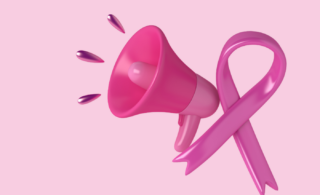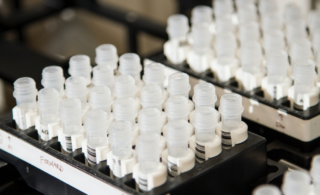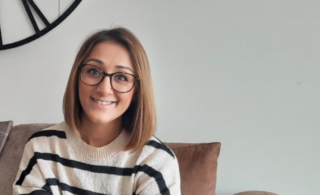
This article looks at the way in which we compare ourselves to others in relation to cancer experiences. It’s written by a clinical psychologist with personal experience of breast cancer and it’s a must read for everyone with cancer.
By a clinical psychologist
AT LEAST…
One of the things I will often hear in my clinic is, “I shouldn’t be complaining, at least I’m not as bad off as X,Y, Z”. The X, Y and Z can be “at least I only have primary cancer” or, “at least I didn’t lose my boob”, “at least I didn’t have to have chemo”. It functions as a way for people to invalidate or dismiss their difficult feelings, but also has the effect of making themselves feel bad or guilty for feeling a certain way.
As a Clinical Psychologist, I would take time to listen to what they were saying, and I could myself physically feel the dismissal and cut-down that they were directing at themselves. I could see the shame ooze out of people when they would say that they should be coping better.
The thing is, you can always find someone in a worse situation than you, but it doesn’t make your situation any better. It doesn’t help to compare because, generally speaking, it minimises your emotional response and makes you feel disconnected from others. There are sometimes exceptions, but often it induces a feeling of guilt rather than compassion and empathy for your own situation.
MEET SOMEONE JUST LIKE YOU…
I vividly remember talking to one woman (let’s call her Jasmine) who I worked with as she finished her breast cancer treatment. She was so negative and critical about the way she was coping after being treated for over a year for breast cancer (chemo, surgery, radiotherapy, herceptin). One session, I asked her to sit and listen whilst I introduced her to someone. I gestured to an empty chair and said, “Meet Anne, she’s just finished nearly a year’s worth of treatment involving harsh chemotherapy, a mastectomy, 20 sessions of radiotherapy and now hormone therapy”. I went through exactly how she was feeling (tired, emotional, stressed, struggling to get back seamlessly into life) and then asked Jasmine to tell Anne that really she should be getting on with things, as “at least her treatment has been effective and she’s not dying.” Jasmine looked at me with tears in her eyes, finally she could recognise what Anne (and she) had been through and she felt some compassion for herself and what she had experienced.
It was sometimes hard for me to understand why people struggled to appreciate all that they had been through and allow themselves the space to have the emotional response.
Until, that is, it happened to me.
MY STORY
So, I’m a Clinical Psychologist in a cancer service. One of my special interest areas is Breast Cancer. I provide clinical supervision to the Breast CNSs (also known as Breast Care Nurses) – a place where they can reflect on their emotional responses to their work and think about how to support their patients’ psychological and emotional needs. One of my other roles is to assess women who are requesting risk-reducing surgery because of a family history of breast cancer. I kind of know quite a bit about breast cancer. So when I had a painful boob and then felt a funny area, I thought I’d better get it checked out. I left it for a week or so and kept checking it (probably a bit too much).
GP APPOINTMENT
The circumstances around getting a GP appointment were pretty coincidental, as we all know how difficult it is to get in to see a GP, particularly when you also work and have young children (so need someone else to look after them whilst you go to the GP). I had booked a phone appointment and in the online reason box, explained that I wanted to ask if was worth being checked or not. Before the appointment, I then had a text from my GP explaining that she had to check all lumps so to come in to the surgery (it was a warm evening when there was an important England game on during the World Cup so they must have been quiet) or to re-book. I hesitated, was I making a fuss about nothing?
But I went along to the GP, explained the situation and apologised about probably being over anxious because of the cohort of patients I see through my work. “I know” said the GP, a female around about my age (40 at the time), “my cousin is 37 years old and she has secondary breast cancer, it’s really sad”.
I had a breast exam, and apologised for my sweaty armpits (it had been a lovely warm summer). She said that she thought it was probably a cyst. She said that they used to just recommend keeping an eye on them and then referring for further investigation if they do not go away after another menstrual cycle. “Yes, I’m happy to do that”, I said. I really didn’t want the fuss of going to clinic with staff that I work with and feeling embarrassed about making a fuss about nothing. “But” she said, “I think the guidelines have changed now and we have to refer all breast lumps”, whilst pulling up the relevant guideline on her computer. “No”, I said definitely, “I’m happy to watch and wait. We both think it’s a cyst, I’m sure it will be fine”. “Well if you are sure, I don’t want to delay your diagnosis” she said. I was happy to wait, I said. We agreed that although it was a small risk, she was being patient-led and doing what I wanted. I left the practice relieved and reassured, feeling happy about my involvement in the decision.
Next morning, I had a text from the GP. She’d discussed me with a senior GP and said that she felt she had to refer me to the breast clinic. I inwardly groaned and panicked, when would I find the time to go clinic? I had my youngest child on my days off and a busy work diary. I was also due to go on holiday one week later. But I also felt it would be silly to ignore the process. I had opted in to the system by going to the GP, maybe I had to see it through.
BREAST CLINIC APPOINTMENT
So on the morning of the clinic appointment, I rushed to work as normal. I let a couple of friends who are psychologist colleagues know that I was going to clinic but that I was 98% sure it was a cyst, so I’d be back as soon as I could.
In the waiting area, I was nervous about seeing staff or patients that I work with. I was expecting to see the ANP but was called through and told I was to see the Consultant. So I found myself about to see the surgeon that my husband works with every other week (he’s an Anaesthetist) and show him my boobs…with sweaty armpits. This same surgeon came on a course I ran with a colleague, called Advanced Communication Skills. It’s a course that covers, amongst other things, breaking bad news. Oh dear, this was not what I planned. So he came in to the exam room and then we went through the questions and exam. I had an excruciating moment when I just revealed my top half and we had to wait for the bed to be raised. I can laugh about it now (nearly). So once my clothes were back on, the surgeon said that it felt like fibrocystic change but there was a possibility that it was breast cancer. I didn’t for one moment think that it would be. I was told that I was going to be there a few hours and not to worry if they took biopsies, as they had to if they saw any solid material. Fine, I thought, I can spare a couple of hours. Now I get to see the patient experience firsthand, what good CPD (Continuing Professional Development) for me as a psychologist.
Mammogram was an odd experience. I tried to look at the screen but the practitioner turned it away and said it was best to get all the results together. I wouldn’t have been able to read the x-ray anyway. Then an ultrasound. I’d been googling images of cysts on ultrasound whilst waiting and did think whilst laying there, that doesn’t look like a cyst. But still I didn’t feel too concerned. Then came the very painful process of core biopsies. The Radiologist used anaesthetic but didn’t seem to leave very long for it to work. She also said it would be 2 biopsies…or at least, that was what I thought she said. It was actually 7 biopsies on 2 areas. I kept thinking, oh that will be the last one, then she’d load up for another one. I was starting to panic about my own working day at that point, I had patients arriving in one hour. I mentioned it to the radiographer but she said I’d be fine, just not to carry heavy notes.
RECEIVING THE NEWS
Whilst in the waiting area, I was offered a cup of tea by 3 nurses, alarm bells were faintly ringing but I just thought it was because I was a fellow member of staff, just on the ‘wrong side’ for the morning. So being called though to the Consultant, I wasn’t expecting bad news. He said (or at least I think he said, because at times of trauma, your memory doesn’t work in the same way), “you’ve got a lot going on in that breast”. “Really?” I said, surprised. I’d thought about how it might feel to get this news so many times so it didn’t feel shocking in some ways, just surprising. He went on to say that I would need a mastectomy (what me?), and fairly soon (but I was going on holiday – couldn’t it wait?). I joked that he could break the bad news to my kids because they were going to be devastated about the holiday. My main priority then was needing to cancel the patients that I had booked into my own clinics for the rest of the day. There was no way I could be helpful to anyone that day!
I then went through the agonising wait for biopsy results, MDT discussion (mastectomy and SNB) and surgery planning.
SURGERY
The day of surgery was just surreal. I hadn’t slept much the night before. The days before were busy with looking after children and a slight obsession with finding the right pyjamas to take on the ward as they needed to be button down so that I could get them on and off, without raising my arm on the affected side. Whilst I went down to Theatre, my husband sat waiting for me, when a few weeks before he would have been the Anaesthetist for the list that I was on. It was just all so surreal.
I was in pain when I woke from the anaesthetic, unfortunately, and then before I knew it, I was on the ward and starting my recovery.
HIGH GRADE DCIS
Another anxious wait before I went back to clinic for my full results. I had to see a different surgeon for my results as the surgeon who did my surgery was on holiday. He was dreadfully serious so I wrongly assumed it was bad news from his demeanour. Plus, he assumed that I might have been rung with my results – I hadn’t as my BCN was off sick. It was high grade Ductal Carcinoma in Situ (DCIS) (fairly extensive over the breast) and no invasive cancer. I honestly didn’t know how I felt. Logically I was pleased it meant no more treatment but in a way, it was hard to make sense of what I was being told. I had thought that due to the extent of the DCIS and my age, there would be invasive cancer. I had prepared myself for being told that I’d need chemo…and now I didn’t. It was so odd – being sucked into this whirlwind of seriousness and being prepared for it to go on much longer. Only to be told 2 weeks after surgery, “that’s it, you’re finished”.
I didn’t know how to feel when I was told they had it all, it was high grade DCIS so my treatment was complete. I couldn’t believe it. I did the comparison, I should feel lucky, happier as I’ve ‘only’ had DCIS. I should be celebrating, my treatment is over. Yet I didn’t feel any of that – I felt numb, shocked and emotionally blocked. I felt guilt that I was the ‘lucky one’ who didn’t need more treatment. I felt shame that I didn’t feel happier and didn’t immediately jump back into where life had temporarily stopped.
DCIS: ‘NECESSARY VS UNNECESSARY…?’
I struggled to make sense of my experience. It was ‘only’ DCIS yet I needed life-changing surgery, and I will need future surgery as I have a breast reconstruction using an implant, which will need to be changed at some point (around 10 years). It went through my mind – was it really necessary? I was aware of the Loris trial where older women with low grade DCIS are offered monitoring rather than surgery as they are trying to understand how DCIS behaves if they don’t remove it. I checked with the surgeon – “it was necessary”, he said, “you had high grade DCIS which is very likely to have become invasive”. Mine was over a significant area and multi-focal so mastectomy was the only option. The surgeon had to take more areas of tissue away to try to get a clear margin. That made me feel better for some reason, it felt more justified.
Trying to get my head round the meaning of DCIS was also difficult. Not least because the medical community are a bit divided about it. Here in the UK, it is called breast cancer. In the US, it is called stage 0 breast cancer. But in the past, it was called a pre-cancer and some UK teams still refer to it as such. My BCN said that it’s not a pre-cancer as the cells look like cancer cells but they haven’t broken out of the milk duct so it’s a cancer in situ. But the cells themselves don’t change once they break out so they are cancer cells.
These mixed messages cause women distress as they don’t know how to class it themselves. Our brains don’t like grey areas or uncertainty so they don’t know what to do with this information. Is it cancer or not? Is high grade different to low grade? Why does it matter, my husband asked? I found this difficult to answer. I think it mattered because I needed to know if my emotional reaction was justified.
Did I deserve the sympathy and flowers I received? I felt a great deal of shame at having accepted these gifts and support from others. Even writing this now, I can feel that visceral shame, in case my friends and colleagues read this sometime. Would they have acted differently if they knew it was ‘only’ DCIS? Of course, you never know the full histology until after the full surgery, by which time, the flowers are already dying or in the compost bin.
I had someone make a comment about a year after my surgery, implying that the surgery was all precautionary. I had a reaction to that; it made it seem like something that was optional. It wasn’t precautionary! There wasn’t a choice! I had cancer cells in my milk ducts and it was highly likely (my surgeon said definitely in someone my age) that they would have turned invasive. Cancer cells need removing!
FINDING CLARITY
Over time, I have found more clarity, I think. It mattered so much as I felt emotionally wounded and vulnerable after the diagnosis process and the significant surgery. I needed to believe that this emotion came after a significant experience and branding it as cancer made the reaction justified. Comparing to others minimised and invalidated my emotional response. Shame made me feel disconnected from others and as humans, we are hardwired to be connected to others. If it wasn’t breast cancer then I should not be welcomed into that supportive breast cancer community, but I had gone through surgery that others without cancer don’t have to undergo. Where did I fit?
Disconnection from others is a lonely place and working through feelings after an experience like this is exhausting. I needed a couple of months away from work to recover emotionally and physically. When I was ready and could put the shame to one side, I could feel some self-compassion and allow myself to feel what I needed to feel. Awareness that comparison doesn’t change what I went through helps, plus feeling sensitive to my emotions and allowing them to just be there without judgement or analysis. Time is also a great healer.
THE FUTURE
Things still catch me out now, over 2 years on. After the recent anniversary of my surgery someone said to me, “gosh, I bet it feels like it never happened, doesn’t it?” That made me a bit angry. Errr, no, every time I look down and see my implant and lack of nipple, I know it bloody well happened. I live with a foreign body in my chest, and every time I use my pec muscle, I feel it. I’m acutely aware if someone in the DCIS FB group I’m part of talks about recurrence or, on the very rare occasion, the finding of metastatic disease (I think that technically this isn’t possible unless they have missed one invasive cancer cell). That’s when I know it was, and still is, a significant experience and my feelings are justified. I am connected to others who have had all types of breast cancer, but I have respect for the differences and the relative risks that others have to manage psychologically. Believe me, I’m acutely aware of how different life after breast cancer is for women who have invasive high-grade cancer and how their risks are so different to mine. I can hold my compassion and understanding for all the different types of breast cancer and the psychological and emotional challenges that they all bring.
So I have been reflecting on why I wanted to write about my experience. I think I wanted to raise some awareness of the experience of being diagnosed with DCIS as a younger woman (can you still call yourself young at 40?) and to think about the whole issue of comparison within cancer.
FINAL THOUGHTS
I guess my message as a Clinical Psychologist, and someone who has had DCIS, is to ask you to be aware of our natural tendency to compare ourselves with others going through the same/similar thing.
- Ask yourself how does comparing help?
- Does it change your experience of what you’re going through?
It can sometimes help to slow down your breathing and experiment with perspective taking on your own experience. If you heard your story from someone else, would you judge them in the same way? It won’t always be easy, but consider it a lifelong work in progress.
To return to the homepage of our Information Hub, click here where you can access more helpful information, practical advice, personal stories and more.
Future Dreams hold a range of support groups, classes, workshops and events to help you and your carers during your breast cancer diagnosis. These are held both online and in person at the London-based Future Dreams House. To see what’s on offer and to book your place, see here.
January 2021 (Reviewed February 2024)
This article was written by a guest author based on their own experience of breast cancer and its treatment. It is important to note that this is one person’s experience and that whilst there may be commonalities between the experiences of different people, everyone has a different diagnosis/treatment plan/general experience. The information and content provided in all guest articles is intended for information and educational purposes only and is not intended to substitute for professional medical advice. It is important that all personalised care decisions should be made by your medical team. Please contact your medical team for advice on anything covered in this article and/or in relation to your personal situation. Please note that unless otherwise stated, Future Dreams has no affiliation to the guest author of this article and he/she/they have not been paid to write this article. There may be alternative options/products/information available which we encourage you to research when making decisions about treatment and support.
Share

Support awareness research
Donate to those touched by BREAST cancer
Sylvie and Danielle began Future Dreams with just £100 in 2008. They believed nobody should face breast cancer alone. Their legacy lives on in Future Dreams House. We couldn’t continue to fund support services for those touched by breast cancer, raise awareness of breast cancer and promote early diagnosis and advance research into secondary breast cancer without your help. Please consider partnering with us or making a donation.



